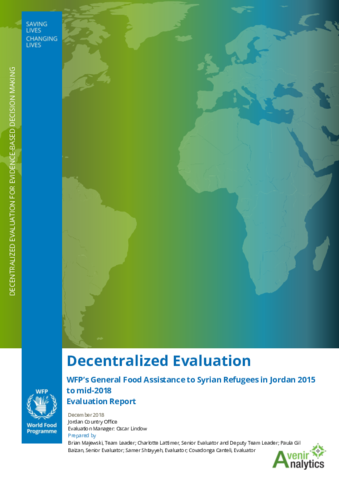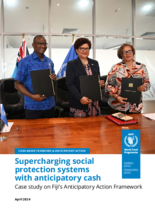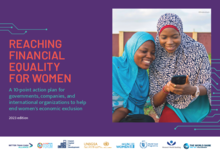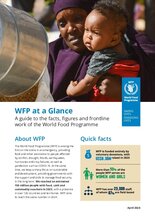
The evaluation was commissioned to assess WFP’s assistance in refugee camp and host community settings across the country, with the dual objectives of learning and accountability. The evaluation will inform the strategic and operational direction of the programme and the CO more broadly as one of the key documents for the formulation of WFP Jordan’s Country Strategic Plan 2020-2022. The evaluation focused on assessing the relevance, appropriateness, coherence, efficiency, effectiveness, sustainability and impact of the programme, with a particular focus on transfer modalities, coverage of accountability to affected populations (AAP) and gender equality and the empowerment of women (GEEW).
Key evaluation findings included:
- The GFA programme is relevant for the context in which it was designed and has been implemented to date. The scale and timeliness of the GFA are appropriate for the needs of the target population, and the Choice initiative - allowing beneficiaries the choice of redeeming assistance using e-vouchers in WFP-contracted shops or by cashing out entitlements from selected ATM’s - demonstrates a flexibility to tailor modalities to the expressed preferences and differences within the target population. Smart programming approaches and innovations have resulted in an efficiently-delivered programme that helps vulnerable Syrian refugees to meet their basic food and nutrition needs.
- While the evaluation found a number of areas that could be improved – including in the areas of accountability to affected populations (AAP), gender, protection, and working effectively with others to maximize added value – the overall conclusion of the Evaluation Team was that the GFA is largely achieving its intended results and making an important contribution to the collective response to the Syria crisis in Jordan.
- All the evidence suggests, however, that the context is changing. Donor funding is predicted to decrease and attention within the Government is shifting away from emergency refugee response. With the likelihood of large numbers of Syrian refugees remaining in Jordan, WFP is faced with a tough challenge – requiring difficult decisions and trade-offs concerning the scale, purpose and precise design of the GFA going forward.
- The forthcoming CSP provides an opportunity for WFP to strengthen existing aspects of the GFA and to re-situate the programme within the changing environment and within its own evolving strategic vision for Jordan. The CO’s strong track record on innovation stand it in good stead to implement any major changes to the GFA and continue improving the quality and effectiveness of the programme overall.
Key strategic recommendations from the evaluation included:
- The CO should review the purpose of the GFA and its measurable outcomes, considering contextual changes and funding forecasts. This recalibration should inform approaches to assessment and analysis, targeting and monitoring.
- For the sake of better overall cooperation and improved coordination of the programme, WFP Jordan should re-invest where necessary in relationships with key partners, including UNHCR, CPs and other cash-oriented actors in the country. The CO should also capitalise on strong donor relations to engage with donors now in discussions about the future of the GFA and identify ways to diversify the funding base;
Key operational recommendations from the evaluation included:
- The CO needs to balance its already strong performance on the GFA payment system with increased investment in the quality of the programme overall. To achieve this, the CO should assign a dedicated programme lead for the GFA, strengthen existing and develop new mechanisms for AAP, and invest in increased in-house gender capacity.
- Extend and expand parameters of the longitudinal survey underway to continue monitoring perceptions and the potential impact of the Choice modality for the GFA. Thereafter, they should review particular aspects of the programme and make necessary adjustments – for example, to their requirements of the Financial Service Provider (FSP), the added value of current levels of investment in retail management, and the ongoing evolution of innovations within the programme.
- Facilitated by the Regional bureau in Cairo, knowledge sharing between similar contexts in the region should be improved- in the case of Jordan to share learnings from successful aspects of the GFA and to benefit from potentially stronger overall programmatic approaches from other countries.



